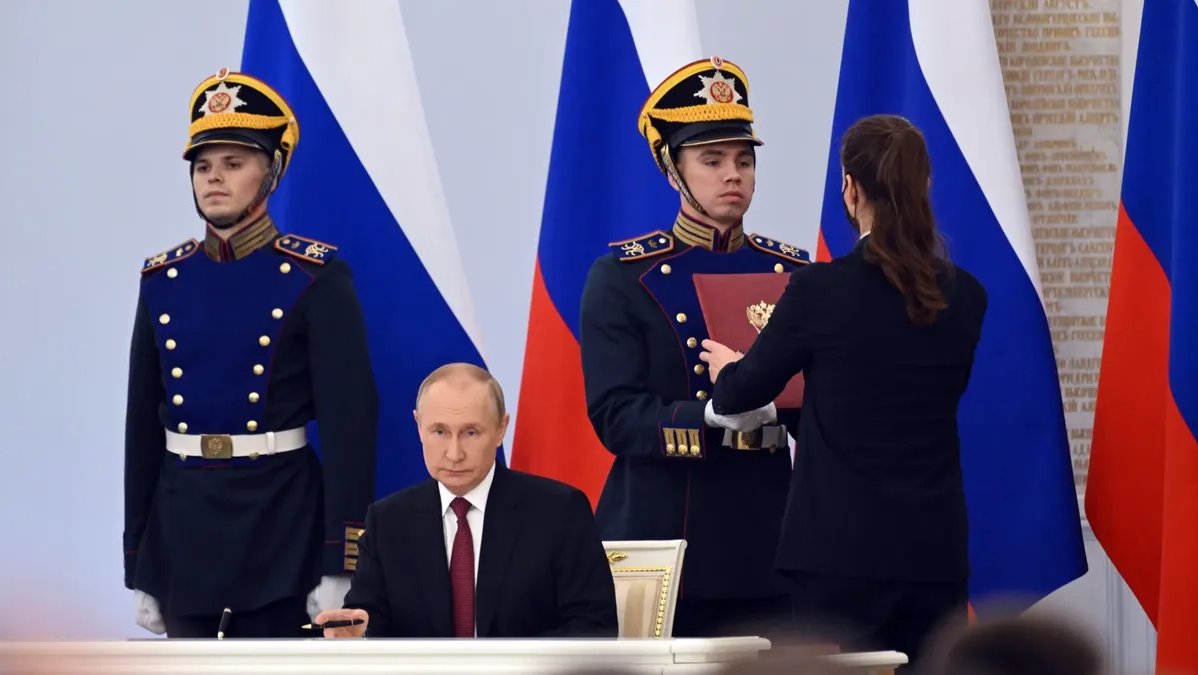Vladimir Putin said in his speech on 30 September that the Kremlin was open to negotiations with Ukraine, however, discussing the status of the newly annexed territories was “out of the question” for him. Ukraine's Zelensky has been clear since day one that another annexation would rule out negotiations completely and was swift to respond on the same day Putin signed the annexation papers: if there is a negotiation in the future, Russia's President must be anyone but Putin. It's hardly thinkable that there might be a negotiation of any kind right now for two reasons.
Reason number one is that the Kremlin's only demand would be Kyiv's capitulation, but this appears way beyond the reach of reason for Putin's scope for progress is becoming more and more narrow each day. Having been defeated tactically twice, he has to prepare another offensive now, running the great risk of losing completely this time.
Reason number two is that a bilateral negotiation with no mediators or guarantors is only possible if capitulation is in question, while a peace treaty requires a neutral venue and a set of international guarantors. Nobody will take the initiative and set up such a negotiation, however, for it has become clear since 30 September that Putin is not fighting a war against Ukraine rather a war against reality, and Kyiv's positions are rapidly becoming more solid.
Putin is nearing the catastrophe at full speed, and Kyiv sees it, so it's no longer advantageous for Ukraine to “back up to 23 February.”
It is now doubtful that the Kremlin would be able to set up a solid “separation line” even if 50,000 troops would be deployed from the Far East. Putin will never manage to withdraw from this war, so this issue will be up to his successor, whoever it might be.
It will be an extreme challenge for the future president as Putin's level of aggression towards Ukraine will force them to do anything at large to assure everyone that this would never happen again. The “Russian menace” has become a global issue, disturbing dozens of countries worldwide at this point.
Zelensky's formula he offered in March which implies backing up to 23 February, postponing the Crimea issue for 15 years, and accepting Ukraine's neutral status is no longer sufficient for Kyiv.
So, what is Russia to expect under a new president? Firstly, a peace treaty will not do with European guarantors only, so China and maybe Canada will need to join the likes of Germany and France. This set of guarantors will have to be gathered by the Kremlin and will require clear and resolute assurance of its good intention. Secondly, a peace treaty will require a new understanding of Russia's place in the system of security in Europe from the Kremlin. This new concept must satisfy the Russia-neighbouring countries and Eastern Europe in general, too. Thirdly, the peace treaty negotiations will inevitably be a haggle regarding Russia's monetary compensation to Ukraine as the damage it had inflicted is colossal. It is likely that Moscow's diplomacy under a new president might agree on a new Marshall Plan, removing the compensation point from the negotiation. This will require enormous diplomatic efforts and, most importantly, Moscow's complete sincerity and transparency.
The Kremlin can no longer hold its separation line, endure attrition warfare, or blackmail the world with nuclear weapons.
Putin may last for several more months, but a peace treaty negotiation, and not a ceasefire, will be inevitable.
A peace treaty negotiation of this kind could resolve all issues of the post-Soviet countries in one single shot: Moscow would barter its compensation payments to Ukraine for closing all its “sore areas” by withdrawing its troops from Moldova's Transnistria, Georgia's Abkhazia and South Ossetia, and demilitarising the Kaliningrad exclave. This set of proposals would be a decent effort towards European security from Moscow, the one that would counterpoise the aftermath of Russia's aggression in Ukraine.
Some may say that this sounds surreal, but this is the way it's going to be as there is no other way Moscow can avoid the impending catastrophe with minimum losses.
Join us in rebuilding Novaya Gazeta Europe
The Russian government has banned independent media. We were forced to leave our country in order to keep doing our job, telling our readers about what is going on Russia, Ukraine and Europe.
We will continue fighting against warfare and dictatorship. We believe that freedom of speech is the most efficient antidote against tyranny. Support us financially to help us fight for peace and freedom.
By clicking the Support button, you agree to the processing of your personal data.
To cancel a regular donation, please write to [email protected]

